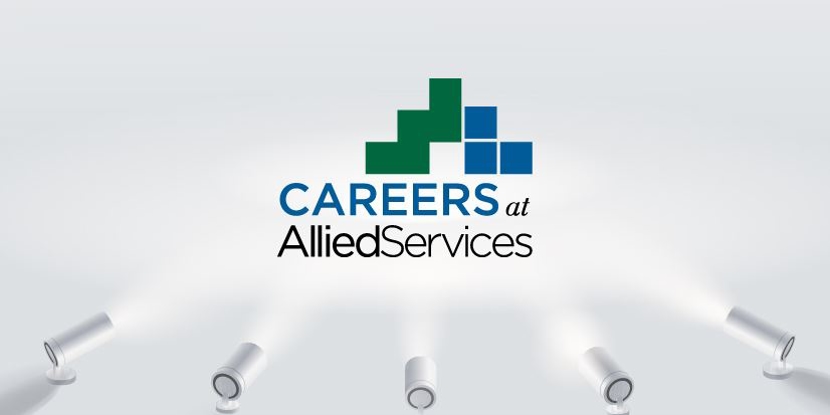Creating Space for Difficult Conversations: The Role of a Hospice Chaplain
- Category: News, Hospice & Palliative Care
- Posted On:
- Written By: Allied Services Integrated Health

While the term Chaplain dates back to the early centuries of the Christian Church, Hospice Chaplain Gerlin Valencia, MDiv, ThM, Ph.D., says his role is more than just religion.
“A chaplain is more than just a religious person. I often say to people you don’t have to talk to me about God, if that’s where the conversation goes I’m happy to talk about God with them - but usually it's more existential topics like - what is going to happen to me or their disease process, things like that.”
As Chaplain for Allied Services Hospice, Gerlin is part of an interdisciplinary team that cares for the patient as a whole, which includes spiritual care. Spiritual health has a profound impact on our physical health, well-being, and quality of life. Just as medical professionals care for our bodies and minds, Gerlin helps to ensure the spiritual needs of his patients are met.
“I help facilitate religious and spiritual needs in any way I can. If we need to arrange visits by a priest, rabbi, or other religious entity I can help. Or I can call on the patients myself. If the patient is not religious at all, then we just talk. We talk about them, their life, their experiences. Anything they want to talk about.”
“Spiritual need is a vital part of the care plan - so whether we are addressing religious or spiritual needs, or just having a conversation we find something that is comforting and provides them with peace.”
Having Hard Conversations
“Though hard, a discussion on death is an important conversation to have. Death is a fact that will come to all of us, and unless we are prepared to have the conversation we will become restless and struggle with the questions - such as, what comes after? What will happen to me? Some people struggle with that idea - they become afraid of the unknown. So Hospice as a level of care and my role as Chaplain is a way of helping them process not just their illness, but some of the emotion that comes with it.“
“A lot of the people that we see are at the end of their terminal illness and have been through so much. Physically, they have given up on aggressive treatments, and emotionally, well, some feel hopeless- some feel angry. Some feel as if they are being punished.”
“Nobody wants to die - and so a conversation about those issues helps start a process of healing in a sense.”
“A question I get a lot is - what if there is a heaven and I don’t make it? That in itself terrifies people. So, we work through their feelings and their questions as they relate to their beliefs. We sort through the emotions that come with the thought process and we work to find ground that gives them peace.”
“I work with our patient's families as well. The process is difficult for them too and a lot of the same emotions - helpless, hopeless, anger - are there, but for those that are acting as caregivers, it’s hard for them to find time for their own process.”
“When they (patients and families) say that they’re not religious or into God and that sort of thing, but they meet me and learn that I am different, and my way of doing Chaplaincy is different - they want me back! Even when people don’t want a “Chaplain” - are usually happy to have me around to talk about their lives.”
Talking about our feelings to friends has been a source of relief for centuries. Multiple studies have shown that simply talking about our feelings, struggles, or emotions with someone can be profoundly healing. By expression, we can reduce stress, strengthen our minds, and reduce physical and emotional distress.
“Most people seem to have a misconception of what a Chaplain is. For me, it’s a person that comes alongside you and walks with you - and along that walk, we talk about anything that is your life now - or once was your life. Your hopes. Your dreams. Your fears. Many people think that a call for a Chaplain is a death sentence, that they will die soon - so they put me off. But then I introduce them to life.”
About Gerlin
Gerlin Valencia holds a Bachelor of Arts in Psychology from Bluefield College, as well as a Master of Divinity in Pastoral Counseling with specialization in Marriage and Family Therapy; a Master of Theology in the Psychology of Religion and New Testament Language and Literature, and a Doctor of Philosophy in Psychology of Religion and Pastoral Care and Counseling from Southern Baptist Theological Seminary.
About Hospice Care
Allied Services Integrated Health System offers both hospice care services to people throughout Northeastern Pennsylvania. Care is provided in homes, medical facilities, and in our Hospice Centers in Scranton and Wilkes-Barre. For patients who have life-limiting illnesses or health conditions, Allied Services Hospice is committed to delivering the highest standard of care with compassionate attention to the patient’s comfort. We offer expert medical and emotional support, with respect for the wishes of the patient and family.
- Call our hotline day or night at 570-341-4320
- Learn more about Hospice Care



